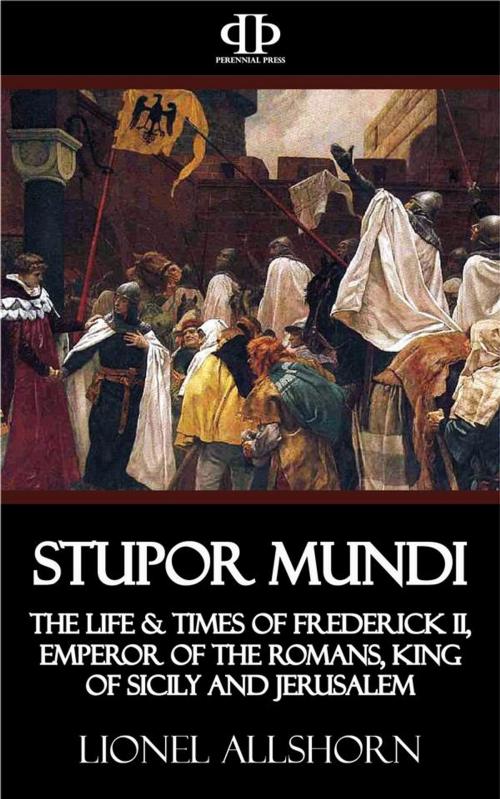Stupor Mundi
The Life & Times of Frederick II, Emperor of the Romans, King of Sicily and Jerusalem
Biography & Memoir, Historical| Author: | Lionel Allshorn | ISBN: | 9781518351075 |
| Publisher: | Perennial Press | Publication: | December 26, 2015 |
| Imprint: | Language: | English |
| Author: | Lionel Allshorn |
| ISBN: | 9781518351075 |
| Publisher: | Perennial Press |
| Publication: | December 26, 2015 |
| Imprint: | |
| Language: | English |
THE arrogant and defiant assertion that man is the supreme controller of his own destinies can hardly be applied, even by the most rebellious intelligence, to those mortals who rule over the kingdoms of the world. However great the personality of a monarch may be, the success or failure of his reign and the magnitude of his power are governed by the temper and tendencies of his age. Our own Henry VIII owed the enjoyment of his absolute authority not primarily to his profound sagacity and dominating will, but to the fact that the men of his century were eager to secure the peace and order that a benevolent despotism brings in its train. And the unhappy Charles was the victim, not so much of his own unstable mind and wavering purpose, as of the gradual revulsion of feeling in a nation which, grown strong and self-confident under the good governance of the Tudor dynasty, was now eager to free itself from the controlling power which had led it into the haven of peace.
Amid the countless examples which History furnishes of this subjection of kings to circumstance, there is none more striking than the career of the Emperor Frederick the Second. This magnificent prince, whom his own contemporaries regarded with amazement and hailed as the "Wonder of the World," and whom a historian of our own age has signalised as "the most gifted of the sons of man; by nature the more than peer of Alexander, of Constantine and of Charles,"1 is denied by posterity the title of "Great" which has been frequently bestowed upon lesser men. His enlightened mind, his energy, his strength and his genius, should have resulted in a reign of a glory rarely paralleled in the history of mankind. Yet through the heritage of strife to which he succeeded, through the formidable power, the overweening ambition and the implacable hatred of the Papacy, he was denied the part of a Builder and compelled to do the work of an architect who seeks to maintain a crumbling edifice and uphold it against the assaults of time. Throughout his life he was occupied in defending the rights of the Empire against the power that assailed it, and thus he was prevented from that work of construction which History demands of those whom she will honour with the verdict of greatness...
THE arrogant and defiant assertion that man is the supreme controller of his own destinies can hardly be applied, even by the most rebellious intelligence, to those mortals who rule over the kingdoms of the world. However great the personality of a monarch may be, the success or failure of his reign and the magnitude of his power are governed by the temper and tendencies of his age. Our own Henry VIII owed the enjoyment of his absolute authority not primarily to his profound sagacity and dominating will, but to the fact that the men of his century were eager to secure the peace and order that a benevolent despotism brings in its train. And the unhappy Charles was the victim, not so much of his own unstable mind and wavering purpose, as of the gradual revulsion of feeling in a nation which, grown strong and self-confident under the good governance of the Tudor dynasty, was now eager to free itself from the controlling power which had led it into the haven of peace.
Amid the countless examples which History furnishes of this subjection of kings to circumstance, there is none more striking than the career of the Emperor Frederick the Second. This magnificent prince, whom his own contemporaries regarded with amazement and hailed as the "Wonder of the World," and whom a historian of our own age has signalised as "the most gifted of the sons of man; by nature the more than peer of Alexander, of Constantine and of Charles,"1 is denied by posterity the title of "Great" which has been frequently bestowed upon lesser men. His enlightened mind, his energy, his strength and his genius, should have resulted in a reign of a glory rarely paralleled in the history of mankind. Yet through the heritage of strife to which he succeeded, through the formidable power, the overweening ambition and the implacable hatred of the Papacy, he was denied the part of a Builder and compelled to do the work of an architect who seeks to maintain a crumbling edifice and uphold it against the assaults of time. Throughout his life he was occupied in defending the rights of the Empire against the power that assailed it, and thus he was prevented from that work of construction which History demands of those whom she will honour with the verdict of greatness...















